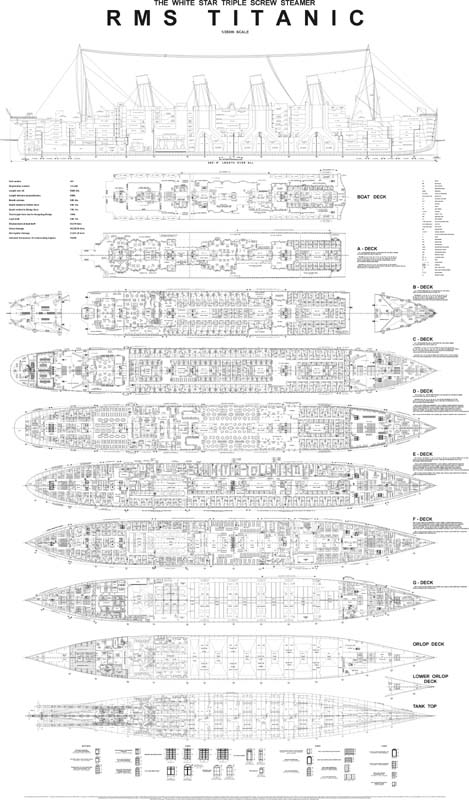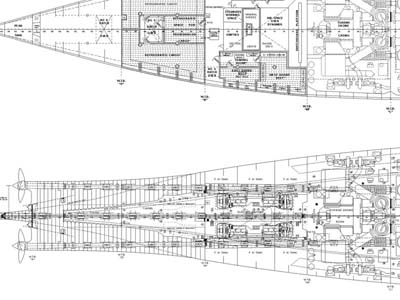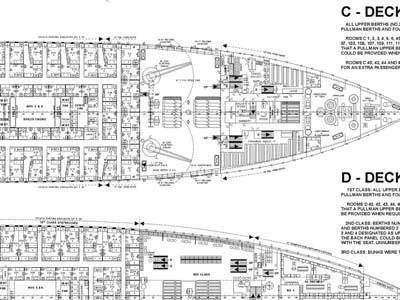Titanic General Arrangement
Plans in 1/350th scale.
(by Bruce Beveridge)
|
|
Have
you ever wondered what the internal arrangement of the post office looked
like on Titanic? The 1st class pantry or 3rd class galley? The Captain’s
quarters, or Scotland For the first time
ever you can look inside the Titanic’s hull and envision how she may have
looked from the passenger and crew’s viewpoint. The Titanic General
Arrangement Drawn by Titanic
historian Bruce Beveridge with the expert assistance of Scott Andrews and
Daniel Klistorner, you will not see anything of this magnitude anywhere
else. Also featured is a
guide to Titanic’s windows that indicates the size of each pattern used on
the weather decks taken straight from a Harland & Wolff specification
book on the This Titanic General
Arrangement plan is just like the well-known 1st class accommodation plan
that has been reprinted in many Titanic books, only in this case, it The size of the plan is
approximately 36” X 54” (914 x 1371 mm) and is suitable for framing. |
Price is EUR 40.00 plus S/H
Order the plans right here:
US customers ONLY. Please contact Bruce Beveridge directly, because
he will handle your order.
|
|
|
´
Note
from Bruce Beveridge:
Being a trustee for the
TRMA, I believe that information such as is available on these plans should be
made available to the public. It is because of this philosophy and love for
this ship, that I drew these plans, and am offering them here.
The references used for
this work encompass, among other things, Harland & Wolff’s general
arrangement plans of the Titanic (early rendition), original construction
drawings and deck iron plans, wreck footage, survivor testimony, period photos,
the Titanic’s (latest edition) 1st class passenger plan, and Olympic general
arrangement plans not commonly available to the public. Most importantly I used
the Titanic’s general arrangement plans issued my Harland & Wolff for the
Limitation of Liability hearings. This plan indicates the correct room numbers
and room configuration of Titanic as she sailed from Southampton. The general
arrangement plan printed in many Titanic resources, and was available from
Harland & Wolff up until a few years ago, is an early rendition and does
not include the later changes made to Titanic’s interiors.
No one knows all of the
Titanic’s general arrangements. A historian can only rely on available
resources, and knowledge of maritime practice of the era, to interpret would
may have been. With every bit of information gathered that I could find, and
after sifting through rolls and rolls of Olympic plans for what would have been
1912 era fittings, I created what should be an accurate depiction of Titanic’s
internals. Those compartments based solely on Olympic are indicated as such,
and compartments based on an educated guess (based on Olympic) are also noted.
Most people in the Titanic Enthusiast arena know me for my studies of external appearance, fittings, and machinery as this is my center of interest. But because of my limitations on the Titanic’s internal arrangements, I had to find historians who specialized in specific areas of the ship to double-check my work. I was able to recruit Scott Andrews for the Engines and auxiliary machinery, and Daniel Klistorner for furniture and room arrangements. These gentlemen are without doubt the best there is in these fields. Ray Lepien contributed greatly by actually purchasing original documents from the Olympic so I could use them for reference, and Peter-Davies Garner, with the help of Steve Rigby unearthed some rare Olympic plans that I needed for the 2nd class compartments and the lower decks of the ship. I thank them all!
Bruce Beveridge
Disclaimer: This item is a product of Bruce
Beveridge alone.


